
LEBANON
NEWS
the war crime of "pre-emptive" strikes in new
UN paper:
Specifically, the new rules of engagement, marked "U.N. Restricted," permit the right of self-defense and "preemptive self-defense" (thereby confirming Israel's right to have moved thus on July 12th 2006. JBraddell,editor)against an anticipated attack. But in many cases, a senior officer has to approve force if U.N. troops are not under attack.
The soldiers can also use force against anyone preventing UNIFIL from carrying out its duties and to ensure the security and freedom of movement of U.N. personnel and humanitarian workers and to protect civilians under imminent threat, the rules say.
The use of force, "including deadly force," is also authorized to defend the Lebanese armed forces that a U.N. unit may be assigned to accompany, providing the threatening group or person is armed.
Force must be commensurate with the level of the threat. But the level of response may have to be higher in order to minimize U.N. or civilian casualties, the rules say.Reuters
OUTRAGE AFTER OUTRAGE:
From : www.AngryArab.Blogspot.com
Wolfowitz the architect behind the latest "drang
nach osten" is right where his fellow zionists want
him to be...
Villages 'carpeted' with
cluster bombs during last few hours before ceasefire
By Colin Freeman; Daily
Telegraph ; Filed:
20/08/2006)
British mine clearance
experts have accused Israel of "carpeting"
Lebanese border villages with deadly cluster bombs,
claiming that more appeared to have been used than in the
American-led invasion of Iraq.The Mines Advisory Group
(MAG), a Manchester-based charity working in the southern
Lebanese city of Nabatieh, said "extreme"
quantities of cluster bombs had been dropped on scores of
surrounding villages during the final days of the
conflict last week.
At least four people, including two teenage boys, have died after stepping on them, and 16 others have been injured, according to medics at the city's hospital.
"The Israelis dropped these in the last few hours of the war when the fighting was nearly over," said Hussein Khatib, a family friend. "They were dropped at night and landed in the rooftops, on the road, everywhere. Israel and America both know that these weapons should be banned, yet they still keep using them."
Israel says that all its munitions used in conflict comply with international law, although the American-based campaign group, Human Rights Watch (HRW), argues that their use in civilian areas breaks a legal ban on indiscriminate attacks. "Cluster munitions are unacceptably inaccurate and unreliable weapons when used around civilians," said Kenneth Roth, HRW's executive director. "They should never be used in populated areas." Chris Clark, the head of the United Nations weapons clearance team in southern Lebanon, said the cluster bombs found were contained in artillery shells and had not been dropped by aircraft. Clearing the unexploded bombs, he said, could take 12 months. Mosques have begun broadcasting warnings about the munitions, and Lebanese army soldiers have handed out leaflets to motorists at checkpoints. Sean Sutton, of MAG, said Israel appeared to have used even more cluster bombs than America during the invasion of Iraq - tactics widely criticised at the time by human rights groups.
"The contamination is incredibly widespread - I have never seen anything like it," he told The Sunday Telegraph. "In Iraq they were used mainly in rural areas and in some villages, but nothing like as much as they have been here.
"We have visited about 30 or 40 villages in the Nabatieh region, and I would say that about 50 per cent of them have been carpeted by cluster bombs, often with one lying every few metres. We have found them on peoples' doorsteps, in school playgrounds, and even in the front room of an old lady's house." Both American-made cluster bombs and Israeli-manufactured copies had been found, he said. "They are essentially anti-personnel devices and we think they have been aimed at areas where the Israeli army thought Hezbollah was firing rockets from."
19thAugust:The Russians know how to Reply to such people:
Israel: Hizbullah used Russian weapons
Israel complained to Russia that Russian-made anti-tank
missiles
reached Hizbullah fighters, who used them with
devastating effect
against Israeli troops.
An Israeli delegation traveled to Moscow earlier this
week to deliver
the complaint, Ha'aretz reported. The anti-tank missiles
proved to be
one of Hizbullah's most effective weapons in the
monthlong war in
Lebanon, responsible for the deaths of at least 50 of the
118 Israeli
soldiers killed in the fighting.
Israel protested in recent years when Russia sold
advanced weapons to
Syria, warning that they would be forwarded them to
Hizbullah, but
Russia dismissed the concerns. A Russian Foreign Ministry
spokesman
said it was "impossible" that Russian weapons
could have reached
Hizbullah.
The Piano Tuner who was refused
admission to West Bank, Palestine writes from Beirut:
Peace
by Paul Larudee
Beirut 15 August, 2006 7:00
a.m. This beautiful, quiet morning in Tyre fails
to appropriately mourn the Lebanese lives that have been
lost. The residual coolness of the night is too
refreshing for the occasion, and the pilotless drones
circling overhead sound more like large mosquitoes than
spotters for the weapons of the fourth most powerful
military force on earth. The drones had plenty to
observe yesterday. If the drive from Beirut is any
indication, as many as 100,000 Lebanese may have tried to
return to their homes in the south yesterday. It
took us nine hours to travel what had been less than an
hour away only five weeks earlier. As hawkers sold
bottles of cold water to a captive market of passengers
trapped in the traffic, residents of the coastal towns
taunted us, "You will not return…"
We laughed, which made the wait more bearable. I
soon tired of taking pictures of bombed-out bridges,
overpasses and pedestrian walkovers. I had enough
to show that Israel had been determined to cripple
Lebanese life and livelihood.
The worst bottleneck was at the Litani, Lebanon's only
major river – three hours of waiting on multiple
meandering paths through banana and orange groves
converging on a single lane dirt embankment built over
culverts barely big enough to allow the river's flow
during the dry season. It is the only way to cross
without a long detour that itself faces the same problem
farther upstream. I decided not to wait in the
car, and instead went down to the river to watch and take
pictures. I got as far as a small undestroyed
bridge over a tiny tributary of the river, and decided
that it was as good a spot as any. I was not
mistaken. Young soldiers unfamiliar with their
authority struggled to control frustrated drivers
blocking traffic to gain a few precious feet of
advantage. At one point an imam in black robes and
turban emerged from his Mercedes to try to mediate a
dispute, but even his authority made little
difference. Most surreal was a young woman in a
halter top walking her dog on a leash. Overlooking
the chaos was a billboard for the Abou Dib Hotel, with an
idyllic scene of resort luxury.
It was dark by the time we arrived in Tyre, where Ismail,
a young Lebanese architect who was kind enough to take us
in his car, suggested that we drop by the home of S, a
dear friend of his. After some warm hospitality and
conversation, partly to assess current conditions, we
headed out again to the village of Siddiqine, which is
the home of Maryam, a third member of our team. We
had previously agreed to spend the night at her family
home in the village. The short drive into the low
mountains took place in pitch blackness except for the
headlights of the cars and the occasional
generator-powered home. For all practical purposes,
there was no electricity anywhere, which meant that the
glow against the sky to the south could only have come
from the bright lights of Israel, invisible in normal
times. The drive took us through Qana, site of the
1996 Israeli massacre of more than 100 civilians who had
taken refuge in the UN compound, as well as the one less
than two weeks ago that reportedly killed another
54.
Soon we began to see destruction all around us within the
short range of our headlights, and then the unmistakable
stench of death permeated the air. At least two
dead cows lay on the road, a small dehydrating calf next
to one of them – a heartbreaking scene about which
we could do nothing. Unfortunately, Maryam's house
was only 200 meters away, down a road made impassable
with rubble. If we decided to stay, we would have
to walk it with a single flashlight (mine) among
us. Maryam's brother had negotiated the passage
earlier in the day and determined that the house was
relatively untouched. However, doing it at night
was another matter, especially with the stench of the
cows in our nostrils and earlier warnings of cluster
bombs. We headed back to the house of S in Tyre,
and accepted her hospitality for the night.
This morning we will head out to Siddiqine and some other
villages to do a bit of factfinding so that we can report
back to our group in Beirut what sort of civil
resistance/solidarity project might be feasible to
undertake. Who knows? Perhaps this will be the
first day since my arrival without a single meeting to
attend. Paul Larudee
16th Aug. Why only North of river Litani?Lebanese, Israeli and U.N. officers met on
the border to discuss the withdrawal of Israeli
occupation forces from southern Lebanon and the
deployment of the Lebanese army in the region. Lebanon
said later Monday that its
forces would be ready to deploy north of the Litani River
this week.
The U.N. plan calls for a joint Lebanese-international
force to move south of the Litani, about 18 miles from
the Israeli border, and stand as a buffer between Israel
and Hizbullah resistance fighters. Murr did not say when
the Lebanese soldiers would move
south of the Litani.
However:
http://www.iraq-war.ru/article/98700
Robert Fisk: Desert of trapped corpses
testifies to
They made
a desert and called it peace. Srifa - or what was once
the
There was no doubt what the
village mukhtar thought. As three Hizbollah men - one
wounded in the arm, the other carrying two ammunition
clips and a two-way radio - passed us amid the piles of
broken concrete, Hussein Kamel el-Din yelled to them:
"Hallo, heroes!" Then he turned to me.
"You know why they are angry? Because God didn't
give them the opportunity of dying."
You have to be down here with the Hizbollah amid this
terrifying destruction - way south of the Litani river,
in the territory from which
Far from humiliating
Down the coast road from Beirut, meanwhile, came a
massive exodus of tens of thousands of Shia families,
bedding piled on the roofs of their cars , many of them
sporting Hizbollah flags and pictures of Sayed Hassan
Nasrallah, Hizbollah's chairman, on their windscreens. At
the massive traffic jams around the broken motorway
bridges and craters which litter the landscape, the
Hizbollah was even handing out yellow and green
"victory" flags, along with official notices
urging parents not to allow children to play with the
thousands of unexploded bombs that now lie across the
landscape. At least one Lebanese child was killed by
unexploded ordnance and another 15 were wounded
yesterday.
But to what are these people returning? Haj Ali Dakroub,
a 42-year old construction manager, lost part of his home
in
Well, I did happen to notice what appeared to be the
casing of a missile hanging from the balcony of a
much-damaged house facing the rubble of Ali Dakroub's
home. And a group of Hizbollah militiamen, one of them
with a pistol tucked into his trousers, walked past us
nonchalantly and disappeared into an orchard. Was this,
perhaps, where they kept some of their rockets?
Mr Dakroub wasn't saying. "I am going to rebuild my
home with my two sons," he insisted. "
"Come out of the ground" is an expression I
have heard several times these past four weeks and I am
beginning to suspect that many of the thousands of
guerrillas did indeed shelter in caves and basements and
tunnels, only to emerge to fire their missiles or to use
their infra-red rockets on the Israeli army once it made
the mistake of sending troops into Lebanon on the ground.
And does anyone believe that the Hizbollah will submit to
their own disarmament by a new international force of UN
and Lebanese troops once - if - it arrives? There was a
symbolic moment yesterday when Lebanese soldiers already
based in southern
Far from driving the Hizbollah north across the Litani
river,
http://news.independent.co.uk/world/fisk/article1219260.ece
15th Aug:Today's haaretz comtains
no fewer than three deliberate provocations, aimed at
making it appear that Hezbollah is going to be the
first to break the cease fire.
Israeli troops killed six Hezbollah fighters Monday in
southern Lebanon, in four separate skirmishes that
illustrated the fragility of an hours-old cease-fire.
http://www.haaretz.com/hasen/spa...ges/
750061.html
"If our fighters deep in Lebanese territory are
left without food our water, I believe they can break
into local Lebanese stores to solve that problem,"
Brigadier General Avi Mizrahi, the head of the Israel
Defense Forces logistics branch, said Monday. Mizrahi's
comments followed complaints by IDF soldiers regarding
the lack of food on the front lines. "If what they
need to do is take water from the stores, they can
take," Mizrahi told Army Radio.
http://www.haaretz.com/hasen/spa...ges/
750384.html
The Israel Defense Forces said Monday restrictions on
the movement of traffic in south Lebanon remain in place
"for now," despite a United Nations-brokered
cease-fire. The army said traffic restrictions south of
the Litani River had not been lifted, even though
thousands of Lebanese refugees reportedly were jamming
bombed-out roads to return to their homes. Imposing the
restrictions last week, Israel warned it would consider
any movement on the roads to be a legitimate Hezbollah
target. The IDF will maintain their air and sea blockade
on Lebanon despite the cease-fire, military sources were
quoted as saying Monday.
http://www.haaretz.com/hasen/spa...ges/
750326.html plus this remark in
Knesset: "When
Hizbullah violates the cease-fire, the world will see who
the aggressor is and will understand us," a source
close to Olmert said.
http://www.jpost.com/servlet/Sat...icle%
2FShowFull
Rowan Berkeley | 08.14.06 - 11:05 am
xymphora.blogspot.com comment
My sister spoke a friend who remained in Tyre. He
said that reports from the front line confirm that
Israeli soldiers get very very frightened when they step
on Lebanese territory. Some of the Israeli soldiers back
to the Israeli side of the border as soon as they hear
gunshots.Angryarab.blogspot.com
Resistance !, August 13th, 2006
A midge, in hundred places, torments him......
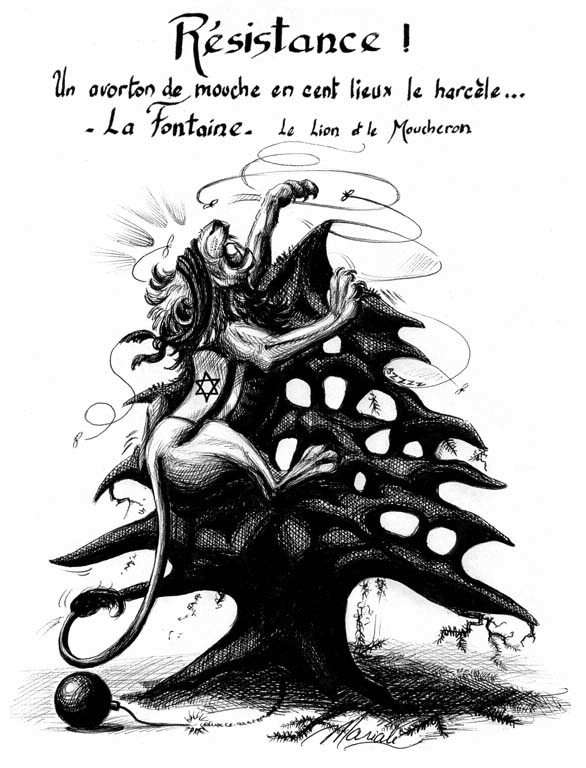
For other drawings on world news :
http://perso.wanadoo.fr/tableauxpastels/caricatures-mariali/
30 Tanks Wiped Out in
Lebanon
12:01 Aug 11, '06 / 17 Av
5766(IsraelNN.com) IDF officials admit that the biggest
surprise of the ongoing war against Hizbullah is the ease
by which terrorists have destroyed IDF tanks.
At least 30 tanks have been totally destroyed or
seriously damaged in bomb and anti-tank rocket attacks
involving state-of-the-art Russian anti-tank rockets.
About one-half of the military personnel killed in
southern Lebanon were inside tanks.
Aug 13, '06 / 19 Av 5766 Ehud Olmert recommends to accept
a ceasefire in Lebanon - but will Israel be the only one
to halt attacks? Plus: Over 20 soldiers killed in battle
in the worst day of casualties since the Yom Kippur War -
what will the future bring?
15:16 Aug 13, '06 / 19 Av 5766
(IsraelNN.com) Magen David Adom emergency medical service
officials report two people have sustained light physical
injuries in the last rocket attack in the border
community. Other victims are being treated for hysteria
AlJazeerah 11th Aug.:
IDF officers on Thursday blasted the diplomatic
echelon claiming that Olmert had restrained and limited
the military from expanding its ground operations into
Lebanon and from dealing a heavy blow to Hizbullah.
40,000 troops were waiting along the northern border for
orders to enter Lebanon and to push up to the Litani, and
an additional 7000 were currently operating on the ground
in Lebanon. A high ranking defense source told the
Jerusalem Post that already early in the morning it was
apparent that negotiations at the UN would not bear fruit
and diplomats there would not succeed in mutually
drafting a cease-fire. The source said that Peretz and
Olmert met for several hours on Friday and reviewed
different drafts of the resolution, "once it became
clear that there would not be a resolution in the near
future, the decision was made for the IDF to launch the
operation." "We gave the diplomatic process a
chance, it failed and now we will achieve our goals
militarily," said the officer. The IDF said that it
would take at least one week to get to the Litani river
and another 4-6 weeks to clear out Hizbullah presence and
rocket launchers from the area.
http://www.jpost.com/servlet/Sat...icle%
2FShowFull
The capture of Marjayoun came just hours before a senior Israeli occupation terrorist official, Rafi Eitan, announced the delay of an expansion of the ground offensive to give U.N. diplomats time for a cease-fire deal. Lebanon and its Arab allies demand Israel occupation terrorist government withdraw its forces as part of any cease-fire.
(Israelis, who are obsessed with occupying Arab lands and shedding more Arab blood, refuse to withdraw simultaneously with the ceasefire, hoping to drag their feet occupying south Lebanon again).
The planned Israeli terrorist offensive would thrust toward the Litani River valley, 18 miles north of the border - and would be aimed at the wishful thinking of crippling Hizbullah before a possible cease-fire.
The Israeli occupation terrorist offensive is expected to last a month and eliminate 70 to 80 percent of Hizbullah's short-range rocket launchers, but not its long-range launchers, senior military officials said.
However, the Israeli occupation terrorist Trade Minister Eli Yishai, who abstained in Wednesday's vote, said the assessment is too optimistic. "I think it will take a lot longer," he said.
The Israeli occupation terrorist government is waiting to see whether Arab and Western diplomats can find a solution to end the monthlong conflict.
The U.S. ambassador to Lebanon, Jeffrey Feltman, met three times Thursday with Prime Minister Fuad Saniora, whose aides reported no progress on negotiations to find a cease-fire.
Relief agencies have sent aid to some Lebanese areas caught up in Israeli-Hizbullah fighting, but progress has been slow, U.N. officials said in pleading for more access.
"Anything short of full access to these areas is insufficient," ICRC President Jakob Kellenberger said.
In other developments:
- The European Union's foreign policy chief, Javier Solana, travels to the Middle East Friday. He plans to visit Beirut before traveling to Israel and the Palestinian territories.
- Richard Huguenin, a spokesman for the International Committee of the Red Cross, said Israel has repeatedly denied requests to reach Lebanese civilians, including a family believed trapped in an abandoned orphanage in Ma'arub, about 12 miles from Tyre. The Red Cross estimates roughly 33,000 people are still living in villages in south Lebanon, another 27,000 in Tyre and 40,000 Palestinians in four camps in the south.
- The World Food Program's coordinator in Lebanon, Zlatan Milisic, said Israeli bombing of bridges and roads is creating huge obstacles for aid convoys to reach tens of thousands of displaced Lebanese.
- Israeli warplanes pounded a coastal highway junction connecting three major southern cities - Sidon, Tyre and Nabatiyeh. The junction already had been nearly cut off in a strike on July 12 - the first day of fighting - which spared only a single lane. It was not clear if the road was completely severed in Thursday's hits.
German Newspaper 10thAugust::
Israeli Prime Minister Ehud Olmert recently described
Germany as his country's "best friend" and
encouraged it to engage militarily in Lebanon. But when
Foreign Minister Frank-Walter Steinmeier came to explore
diplomatic solutions, Olmert kept him waiting while his
government decided to greatly expand Israel's offensive
in southern Lebanon.
Even the United
States -- in all likelihood a much greater
"friend" of Israel's -- was apparently
surprised by the Israeli cabinet's decision.
Internationally, the chances of securing a resolution for
southern Lebanon in the near future seemed to disappear,
because the Israeli military spoke of a large-scale
offensive that could last up to 30 days. Israeli soldiers
were meant to comb the area up to the Litani rivier,
driving out any Hezbollah guerrillas.
Then, in the early hours of Thursday morning, came the
surprising news that the offensive had been suspended in
order to give diplomacy a chance.In Beirut, the
government offered to deploy Lebanese troops in the
south, and in Jerusalem, the plans to expand the Israeli
offensive were put on hold. A tiny window of hope has
opened, but it could slam shut again at any moment.
Peter Philipp is Deutsche Welle's chief correspondent.
Hizbullah's attacks stem from
Israeli incursions into Lebanon
By Anders Strindberg
"Since its withdrawal of
occupation forces from southern Lebanon in May 2000,
Israel has violated the United Nations-monitored
"blue line" on an almost daily basis, according
to UN reports. Hizbullah's military doctrine, articulated
in the early 1990s, states that it will fire Katyusha
rockets into Israel only in response to Israeli attacks
on Lebanese civilians or Hizbullah's leadership; this
indeed has been the pattern.
In the process of its violations, Israel has terrorized
the general population, destroyed private property, and
killed numerous civilians. This past February, for
instance, 15-year-old shepherd Yusuf Rahil was killed by
unprovoked Israeli cross-border fire as he tended his
flock in southern Lebanon. Israel has assassinated its
enemies in the streets of Lebanese cities and continues
to occupy Lebanon's Shebaa Farms area, while refusing to
hand over the maps of mine fields that continue to kill
and cripple civilians in southern Lebanon more than six
years after the war supposedly ended.What peace did
Hizbullah shatter?
Hizbullah's capture of the soldiers took place in the
context of this ongoing conflict, which in turn is
fundamentally shaped by realities in the Palestinian
territories. To the vexation of Israel and its allies,
Hizbullah - easily the most popular political movement in
the Middle East - unflinchingly stands with the
Palestinians.Since June 25, when Palestinian fighters
captured one Israeli soldier and demanded a prisoner
exchange, Israel has killed more than 140 Palestinians.
Like the Lebanese situation, that flare-up was detached
from its wider context and was said to be
"manufactured" by the enemies of Israel; more
nonsense proffered in order to distract from the
apparently unthinkable reality that it is the manner in
which Israel was created, and the ideological premises
that have sustained it for almost 60 years, that are the
core of the entire Arab-Israeli conflict.
http://www.csmonitor.com/2006/0801/p09s02-coop.html
from JULY 21ST ON....
"We have lost faith in you
because your democracy got exported to us with your
missiles, and we are consuming them while you are
consuming our news."
OIL SPILL
 (SATELITE PICTURE)
(SATELITE PICTURE)
Lebanon's coastline could take up to 10 years to recover from a massive oil spill, the nation's environment minister has said. Yacoub Sarraf said it was impossible to tackle the problem while the conflict between Hezbollah and Israel continued.
Marine experts have warned the spill could pose a cancer risk to people living in the affected areas.
The oil slick caused by Israeli bombing of a power station now covers 120km (75 miles) of the region's coasts. Mr Sarraf said the delay had already severely affected the Lebanese shores."The damage has been done. It goes without saying that the whole fishing community will be hit for at least two or three years before the ecosystem re-establishes itself," he told BBC News.
BLOG MESSAGE:I send
following the translation of an article appeared today on
a major italian leftist newspaper (Il Manifesto).
I am also asking the community if you have suggestions on
how to collect, preserve and store (and send out),
material related to the
allegations of chemical and biological samples (in the
present difficult conditions). Any other suggestion that
can help to conduct the enquiry or, better, to set up an
independent expert internationally recognized enquiry
will be most welcome.
INTERNATIONAL COMMETTEE FOR THE NEW WEAPONS
Angelo Baracca, Paola Manduca and Monica Zoppè
By now are countless the reports, from hospitals,
witnesses, armament experts and journalists that strongly
suggest that in the present offensive of Israeli forces
against Lebanon and Gaza 'new weapons' are being used.
New and strange symptoms are reported in the wounded and
dead.
Bodies with dead tissues and no apparent wounds;
'shrunken' corpses; civilians with heavy damage to lower
limbs that require amputation, which is nevertheless
followed by unstoppable necrosis and death; descriptions
of extensive internal wounding with no trace of shrapnel,
corpses blackened but not burnt, and others heavily
wounded that did not bleed
Many of these descriptions suggest the possibility that
the new weapons used include 'direct energy' weapons, and
chemical and/or biological agents, in a sort of macabre
experiment of future warfare, where there is
no respect for anything: international rules (from the
Geneva convention to the treaties on biological and
chemical weapons), refugees, hospitals and the red cross,
not to mention the people, their future, their children,
the environment, which is poisoned through dissemination
of Depleted Uranium and toxic substances released after
oil and chemical depots are bombed.
Right now, the Lebanese and Palestinian people have many
urgent and impellent problems, yet many people believe
that these episodes cannot and must not pass ignored. In
fact several appeals were launched to
scientists and experts with the aim of investigating the
issue.
With the intent of responding to such appeals, we have
set up a team to investigate the testimonies, the images,
and possibly the material evidence that delegations and
ONG will be able to bring from affected areas. We want to
offer support to health institutions of Lebanon and
Palestine, which ask constantly for help and external
verification and monitoring, and we are examining all
materials available in order to formulate hypothesis
which can be verified or disproved.
We ask for the activation of our (Italian) scientific
institutions, and, following the request from medical
personnel in the conflict area, we ask that the UN set up
a international independent verification
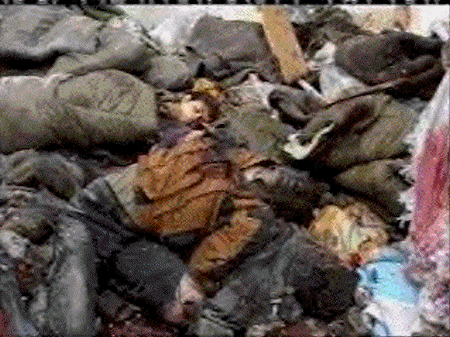
Mayssoun Sukarieh Beirut 30 July 2006
I have been feeling numb for a while, the overwhelming
news in the past few days has focused on the displaced,
the searing stories of people who fled in fear and left
all their possessions behind. Pleas on the TV stations
and on the radio of people who lost their loved
ones...Stories of their anxiety about homes they left
behind...Scenes of people murdered on the roads as they
fled...And stories of the destruction they witnessed on
those roads.
I get confused: Am I seeing and hearing the stories of
Palestinians who fled their homes in fear in 1948?
No: I am in Beirut, it is 2006, and these are the stories
of the Lebanese who have been rendered refugees, but by
the same perpetrators of the 1948 displacement: the State
of Israel.
I have been collapsing. I cannot even write, or
talk...I'm sad for my niece and nephew who were dreaming
of a summer in Lebanon, where they hoped to attend a
performance of the legendary Fairuz in Baalbeck, of
seeing the ancient ruins they'd read about in their
school in France. My niece was anxiously waiting to
visit.
I have been feeling imprisoned, in a jail cell that is
getting smaller and smaller by the day. I miss strolling
by the sea. I miss reading some news...I miss receiving
good news...
Good news: Analysts are saying Israel lost the war!
Israelis themselves are now claiming this. I never
imagined in my life that I would hear of a defeat of the
state of Israel without feeling victorious and elated.
Instead, I am scared to feel happy. Israel will never
accept their loss...God save us from what they will do
next.
We woke up this morning to the news of another massacre
in Qana, the town that suffered so much in April 1996.
Reporters are choking on dust while reporting on air from
the scene of the crime. The bodies of children and women
start to come out.
Ten bodies were removed. Twenty bodies were removed.
Forty bodies were removed.
More than 50 bodies have now been removed.
Twenty-one children under ten women, and under them, more
women and children.
The rescuers are people from the village, and the story
as told by one of the lucky who survived to the Lebanese
reporters is as follows:
"We were 63 people from two families in that
shelter, we came to this house because it is in the
middle of Qana; our houses are mostly on the outskirts of
the village and whenever Israeli shells we get hit with
shrapnel. We decided we needed to move to this house
since it is in the middle and we will be safer. We have
been staying here for more than fifteen days, we do not
leave the house, and the Red Cross brings water and food
for us. At 1:00 AM, after everyone was asleep, my cousin
called me to have a cup of tea. I went to his room, and
as we were just about to sip our tea, we heard a loud
explosion and, yaa Muhammad!, dust filled the air. My
cousin started to cry, 'My family, my children...they are
gone!' I started to comfort him. Then, a few minutes
later, another Israeli missile hit the same building, and
there was so much dust that we could not see....We went
to the center of the village and we started to yell for
anyone who was still there and had refused to move to
Beirut. We told them there is a massacre and we need
help! They started to call for the Red Cross, for other
rescue organizations, for the Lebanese Army. We kept
crying for help. From 1 AM until 8 AM, the rescue team
that you see, the very meager Red Cross, and a few
Lebanese army soldiers, mostly people from the village,
arrived to help us.</BLOCKQUOTE>
An Al-Manar reporter, barely able to control himself,
says "God is Great!" after each sentence.
Scenes of horror: corpses of babies, one child, two
children, three children. Fifty-seven murdered -- half of
them are children under 13.
With each body removed from under the rubble, journalists
run to take photos.
Click! Flash! Click! Flash!
How can they do it? I am outraged on behalf of the dead,
who are turned into objects for the camera to
catch...objects for some photographers hoping for a
"killer" shot to advance his or her career.
I am now at my computer, trying to tell my friends what I
am watching on the screen; in other words, I am doing a
body count.
I write to a friend, and get an email back from her:
"I wish you could send me footage for people here to
see in the US!"
I am not sure how much you need to see in order to feel
outrage, in order to refuse wars, in order to denounce
this murder and destruction.
Why should I send footage for you to see? If the eye sees
while the brain is dead -- dead from the bloody images
you see so frequently that they get normalized -- what
then happens if you see? Maybe you'll send me an apology?
Write creatively about it? Try to aestheticize
this? Call for a theater performance with
eloquently spoken words in order to give people an
incentive to come here, or to act? But they won't come.
What happens if you see? You will cry a bit, like me, and
maybe go about your day as planned. What happens if you
see? Will the US public opinion change?
But can there be people who do not yet know what is
happening here? Do they need to see the dead in order to
know who to vote for the next time, in a country where
there is next to no difference between Republicans and
Democrats?
Does it require much more knowledge for you to know that
wars that kill innocents are unjustifiable? Do we need to
see the dismembered bodies, the demolished houses, and
the shattered dreams? Do we need to see "women and
children weeping" in order to humanize those who are
dying?
Is there not a danger that the result of repetitive
viewing of these crimes and atrocities might only result
in amnesia and numbness? Is it simply knowledge that you
lack? Or is it the courage to understand what we know. Is
it the courage to draw conclusions that you lack?
Put our knowledge into your practice.
Integrate our minds into your emotions. Be passionate
about what we know. That will give us, and you, the
courage to act.
How many more massacres do you have to see to know that
the state of Israel is brutal? Aren't Deir Yassin, Kafar
Qasem, Safsaf, Tantoura, Sabra and Shatila, Qana I,
Marwaheen, Sour/Tyre, and now Qana II information enough
for you to know the meaning of terrorism?
Just how many outcries do you need to hear before you act
out of a commitment to humanity, a humanity that links
you and me and so many beyond this sick consumerism of
images?
To tell you the truth, my friend, we have lost faith in
the idea that "public opinion" is capable of
changing anything. We have lost faith in an international
community that can back us and stop these massacres. The
UN is now just another cold and unfeeling face of the
United States.
Or it is simply an organization as helpless and powerless
as we are here. Its representatives die under the bombs
alongside us, and no one is allowed to condemn Israel. We
have lost faith in you because we do not think you can
act on your knowledge, or that your knowledge even
matters anymore.
We have lost faith in you because we think your
governments do not give a damn about how you think or
what you think. We have lost faith in you because you do
not live in democracies, and hence your opinion does not
matter anyway!
We have lost faith in you because your democracy got
exported to us with your missiles, and we are consuming
them while you are consuming our news.
Mayssoun Sukarieh is a native of Beirut.
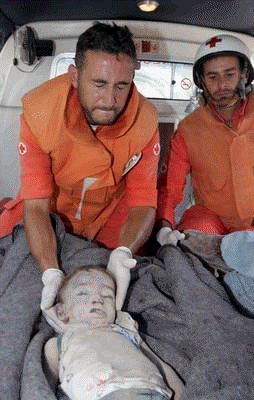
More than 30 children died in the
Qana attack on Sunday 30th July - the deadliest
Israeli raid since hostilities began on 12 July when two
Israeli soldiers were seized when they
crossed the border into Lebanon . But the US is still
resisting calls for an immediate ceasefire.
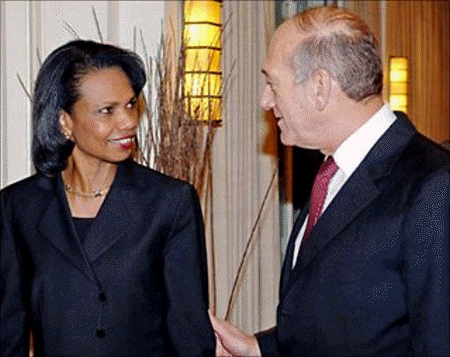
rice/olmert july30th

The Israeli strike
killed displaced civilians sheltering in the basement of
a three-storey house. Old people, women and children were
among those killed. Correspondents say Qana holds bitter memories
for the Lebanese. It was the site of an Israeli bombing
of a UN base in 1996 that killed more than 100 people
sheltering there during Israel's "Grapes of
Wrath" offensive, which was also aimed at destroying
Hezbollah.
BBC WorldNews and from the AngryArab: An American friend
who watched US TV news coverage of Qana Massacre II sent
me this:
"Nauseating. It started out with "Well, Israel
didn't know there were civilians there" and went to
"It's all Hezbollah's fault anyway" to
"Maybe Hezvbollah actually blew up the building
after the Israeli airstrike" when Israel admitted
that it was them "Israel didn't know there were
civilians there". I've watched it spun ten different
ways in about 5 hours."
posted by As'ad
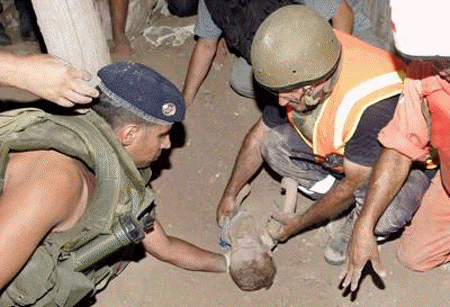
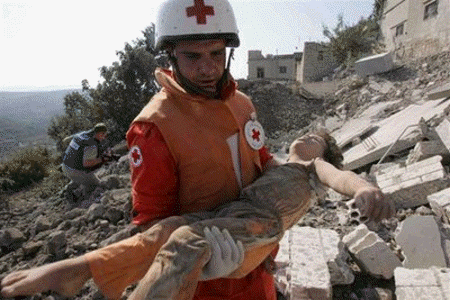
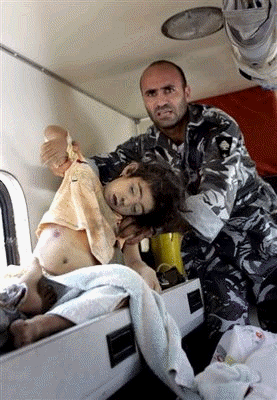
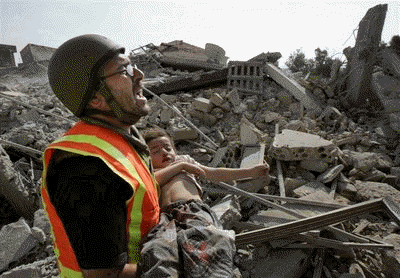
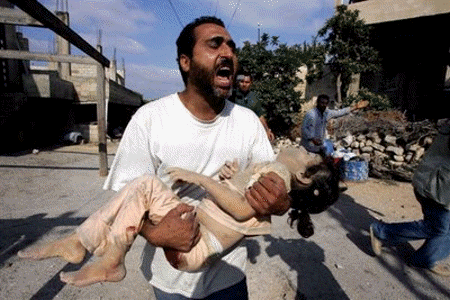
No real
humanitarian access in the south
Christopher Stokes, of Doctors
without Borders, was quoted in Lebanon's Daily Star
newspaper (http://www.dailystar.com.lb) saying: “In effect there
is no real humanitarian access in the South; the
international community is deluding itself with talk of
humanitarian corridors. Talk of humanitarian corridors
should not mask the real situation. We have had contacts
(with the Israeli army). They have not been very
productive, in terms of having contacts for security
guarantees and we not been given any encouragement that
we would have the guarantees to work in the south”.
Stokes had nothing but praise for the Lebanese workers.
"Lebanese associations are doing most of the work in
the south, without any security guarantees," he
said. "I have been in a lot of war zones, I
have rarely seen people so committed ... They are
the ones doing most of the work, not the
international community." He said
it was impressive how many Lebanese doctors and
surgeons in local hospitals had sent their families
to safety but stayed behind to serve their
communities.
In their daily update, the
Lebanese Higher Relief Council stated that towns and
villages along the border with
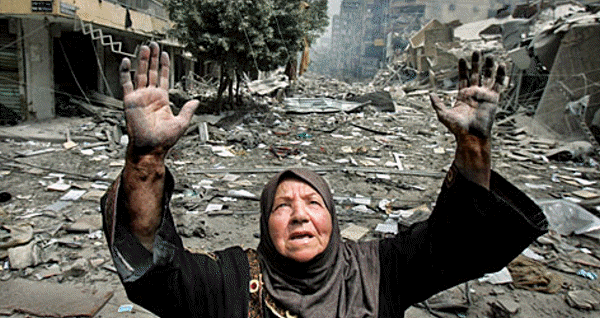
Fears of a ground invasion of southern Lebanon are growing as Israeli tanks and soldiers mass on the border of the country. Some reports said there could be three or four divisions in place by the weekend.
Army reservists are also being called up, further fuelling speculation about a ground offensive.
According to Sky News correspondent Colin Brazier on the border, house-to-house fighting is already taking place in four villages.
Israel's army chief has confirmed that the army will conduct limited ground operations in Lebanon if necessary.
Doctors and NGOs are reporting heavy civilian casualties in south Lebanon after Israel's offensive in the area.
Although as many as 500,000 people have left the border area, which has received the worst of the Israeli bombing, thousands remain.
In the village of Sreefa near Naqoura at least 21 people were confirmed killed and 60 missing after Israeli rockets hit 13 homes yesterday.
Nayla Mouawad, the Lebanese social affairs minister, said: "Sreefa has suffered a real massacre but we don't have enough details."
Although the current toll in Lebanon is above 300, it is likely to be higher, especially in the southern areas where bodies have not been recovered, doctors say.
Doctors and emergency services working in south Lebanon say it is extremely difficult to get access to the wounded because Israel has fired on Red Cross vehicles and civilian traffic.
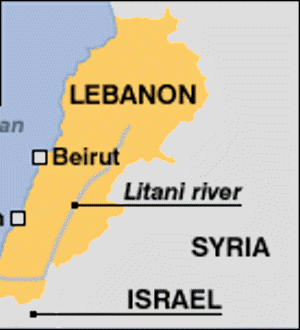
me thinks it is the Litani River that these
"israeli" military and political thugs are
after................editor JBraddell
No Haven in a City
Paralyzed by Dread
Washington Post | July 20, 2006 | P. A01
TYRE, Lebanon, July 19 -- Soon after dawn Wednesday,
Ibrahim Khalil Heidar readied his green Mercedes. His
wife, son and daughter-in-law climbed in, carrying no
more than would fit in the trunk. Their neighbors, among
them eight women and four children, piled into two other
cars, a white and a blue Mercedes. On the roof of each
vehicle, they carefully tied a white sheet that rippled
in the morning breeze. A universal message, it was their
plea for protection.
They then left their small border town of Aitaroun,
already barraged by Israeli airstrikes, and made for
Tyre, and safety. But little around them was safe. A
bomb-hewn crater blocked one road. A detour brought them
to another crater. "Around and around" they
drove, Heidar recalled, before they reached a narrow,
buckling road an hour later that ran along a grove of
ripening lemons bordered by stately pines.
"We didn't hear anything until the missiles struck
us," the 75-year-old Heidar said. "One, two,
three -- I have no idea." From his hospital bed in
Tyre, he shook his head at a memory just a few hours
old."God help us," he said.
In more than a week of Israeli airstrikes, his home of
southern Lebanon has shattered like a china plate. Among
its shards are the broken lives of tens of thousands of
people fleeing villages such as Aitaroun, and tens of
thousands more stranded in Tyre, a besieged city spread
out along the Mediterranean Sea where aid and hospital
officials say a humanitarian disaster is unfolding.
Red Cross officials here said scores of people were
killed in attacks across the south on Tuesday. With roads
under threat of attack, they said, the office's five
ambulances couldn't reach villages, leaving victims
buried under the rubble. Braving the shelling that
residents describe as random, cars flew white flags from
antennas, rolled-up windows, sunroofs or hand-held
flagpoles.
Civil defense workers, too scared to venture out in
firetrucks, had to leave a rotting corpse in a humid sun
along one road. His bloodied head was propped against the
window of his car, struck on Tuesday. Clothes spilled out
of torn suitcases in the trunk; on the ground lay pink
and blue baby shirts.
Tyre, a city of 60,000 before the war, 12 miles north of
the Israeli border, is paralyzed by fear and dread.
Hundreds of people have fled to The Tyre Rest House, a
beachfront hotel, hoping for an evacuation. The city
itself is deserted: No shop is open; few cars ply the
streets, which are strewn here and there with rubble. In
a traffic circle, a horse grazed , as a lonesome car
alarm pierced the afternoon sky, drowned out every so
often by the trail of Israeli jets
and the thud of bombing.

"It's not the end. This is only the beginning,"
said Katya Taleb, who got married last month. "It's
the beginning of the end."
The road into Tyre hugs a coast under blockade by the
Israeli navy. A scarred landscape unfurls. Virtually
every bridge is destroyed. A white Mercedes, its windows
shattered, is perched along one; several cars are
abandoned near a cemetery. Bombs have etched craters
along the highway, spraying the asphalt like buckshot.
Livestock sits untended in a corral; watermelons and
tomatoes rot at fruit stands.
A green medallion hung from his rearview mirror.
"Mohammed," it read. "God loves me, and I
love God," said Mansour, a father of two.
Then he turned more serious: "I have young. They
have to eat. I don't like it, but if I don't work, they
don't live." Oncoming cars, speeding at 80, maybe 90
mph, flashed their headlights as a warning. In the
distance, smoke rose from the road after it was struck
by a shell. Cars screeched into a U-turn, then sped off
in the other direction. At times, drivers flagged other
drivers. "What's the best way to Beirut?" one
shouted. Another, stranded, yelled: "Please help me!
Please! I need a mechanic."
Along a dirt road crossing the Hasbaya River, a car had
collided with a telephone pole.
"You have to have tough nerves so this doesn't
happen," Mansour said."Scary," he then
kept repeating under his breath. "Scary.
"
A crater sits at the entrance to Tyre, mounds of asphalt
and dirt gathered beneath apartment buildings with
shattered windows. Awnings hang in the geometry of
destruction. Every so often, a group of mainly young men
sits inside the entrance of an apartment building.
Otherwise, the streets are given over to stray dogs. On
one stood Mohammed Rahhal, a 25-year-old
laborer."We're catching the worst of it -- day and
night, night and day," he said. Crusted blood was
still on Rahhal's ear, a wound he'd suffered a day before
when an Israeli air raid targeted a building next to his
masonry workshop. "The Israelis want to empty the
south so that they can destroy it," he said.
"We want to leave, but there's no way out,"
said Sabina Hijazi, with her four children between the
ages of 2 and 13. She started crying, and her words
poured out. The bombing terrified her children;
occasionally, it shook her house. No banks are open, so
she can get no money. Nor are the shops, so no food. Her
son is sick, but she's too scared to venture out to the
hospital. "What can I do?" Hijazi asked.
"How can I get my children out of here? If we can't
leave, we're left facing death."
Hospital officials estimated that perhaps 12,000 people
have already left the city, maybe more. About 15,000
poured in before the roads became too dangerous. Ali
Mroue, 15, said his family had spent most of the time
since then in the basement, with 75 others. During the
fiercest barrages, the children cried, and parents
recited verses of the Koran or read to themselves
quietly.
Across the city, families are relying on what they had
stocked before the fighting began -- bread, beans, milk,
sugar, cheese and lunchmeat. Electricity was cut on the
second day, spoiling some of the food, and water
followed. The sick are running short of medicine. In
attacks that have left residents bewildered, a private
school was bombed, as was the
civil defense headquarters and fire station. "It's
hell," said Taleb, the newlywed. "The attacks
are absolutely random," said her husband, Ali.
"They don't discriminate...
Next to Taleb was Martha Dubois, the French principal of
the private school that was bombed. One of her students,
14-year-old Saraya Baydoun, walked by, her face cut when
a bomb hurled debris near her house. Dubois had not seen
her in days.
"Sweetheart, you're okay!" she said, hugging
her.
At the small Red Cross office, its five ambulances parked
outside,
frustration reigned as many of its 50 volunteers sat
idly. On this day,
they were especially upset about the events in the nearby
village of
Srifa, where the office's director, Sami Yazbak, said
bombing had
collapsed 20 houses and buildings. One ambulance had made
the perilous
trek, and its crew estimated that between 60 and 80
people were still
buried there.
"We're not sure if they're dead or alive,"
Yazbak said. "No one can get
there and take them out from under the rubble. It's not
just Srifa. It's
all the villages. Sometimes people are still alive, but
there's no way
to get to them. You just can't help them."
He looked over a map, roads to the largest villages
highlighted in
black. "Every day is getting worse than the day
before," he said.
One volunteer, Qassem Shallan, said he had taken a call
from an elderly
couple in the village of Byut al-Sayyid. They pleaded for
the Red Cross
to pick them up, to bring them water, to deliver
medication for the
woman's high blood pressure.
"I started crying," he said. "There's no
way to get there. I don't know
if she's still alive."
At Najm Hospital, doctors who had been working eight days
straight said
they were running low on antibiotics, gasoline for the
generator,
oxygen, suture, cotton and gauze...
Ali Najm, a 35-year-old radiologist, beckoned a visitor
into a small
room. "Here, I want to show you something," he
said. Najm knocked, then
gingerly opened the door. Inside was his wife, 8-year-old
son and
11-year-old daughter, along with his sister-in-law and
her three
children, all of whom have been sharing a cramped room
for a week now,
deeming the hospital safer...
A few rooms down was Heidar, the patriarch of the family
whose cars were
attacked coming from Aitaroun on Wednesday. On the road
into Tyre, he
had followed 100 yards behind the two other cars. The
missiles struck
those cars, and the survivors crawled out, clambering
into the lemon
grove. Seeing the blast, Heidar and his family followed
them, abandoning
their Mercedes. "The bombing came right on top of
us," he said.
A blast severed his left pinkie finger, cut his back and
broke his foot.
He crawled over to his daughter-in-law, Insaf, who was
also wounded. His
71-year-old wife, Leila, was stranded farther away. Less
than a minute
later, there was another explosion.
His wife was so dismembered that the hospital had no
corpse to bring to
the morgue. Three others in the group died, including
31-year-old
Ghassan Faqih, whose 3-year-old daughter, Narjis, lay in
another bed,
staring at the ceiling. Her face was peppered with blood.
"You see, my family." Heidar couldn't go on.
His pale blue eyes watered,
and he swiped away dirt still in his gray hair from the
Israelis'
attack.
*****
The Israeli military's chief of staff Dan Halutz said
that Israeli
"operations are centering on south Lebanon. Among
other things, the army
is trying to cleanse the border zone of Hezbollah
outposts and attack
the villages from which Hezbollah is firing. When the IDF
discovers that
Hezbollah is firing rockets at Israel from a particular
village, Halutz
said, the army warns the residents to leave the village
and then bombs
it..."
Haaretz, July 20, 2006 http://www.haaretz.com/hasen/spages/740251.html
The group, which was forced to spend the night in the
open on the beachfront after the evacuation was cancelled
on Wednesday, are being transferred in UN convoys to Tyre
port then ferried to an awaiting passenger ship.
Many Lebanese fear that the violence could escalate further once the foreign nationals are evacuated.
"I have a very bad feeling that after the foreigners flee the bombings will get worse," Beirut resident Ziad Nayef told Reuters. "Nobody cares about Arab lives." BBC
Saudi Foreign Minister Prince Saud Al-Faisal criticized Israel’s heavy-handed actions against the Lebanese people.
“The Lebanese crisis today has reminded us of the arrogance which characterizes Israel’s policies toward its Arab neighbors,” he said to the press. “An entire country has been destroyed as a result of the capture of two soldiers.”The official announcement of the visit said the meetings “will permit the evocation of questions of a regional and international nature, in particular the situation in Lebanon, the Middle East and Iraq, as well as Iran. On the level of bilateral relations, the different political, civil and military aspects (of our relations) will be examined, as well as those of an economic nature. We desire to reinforce our cooperation in all these domains at a time when the Kingdom engages itself in a process of economic and social reforms.”